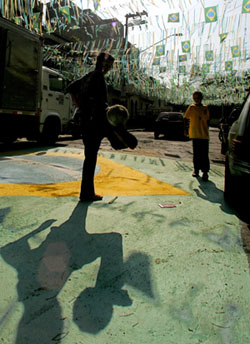Vila Brasilandia, an poor, remote neighborhood in
Sao Paulo, has been gripped by World Cup fever. Rough portraits of the Brazilian
squad adorn walls. Green and yellow national flags hang overhead.
The decorations lend a festive atmosphere to the otherwise gloomy vision of
sidewalks cluttered by wheelbarrows, scrap metal, and cardboard.

Boys play with a ball
on top of a Brazilian flag painted over a street in Sao Paulo to celebrate
the World Cup.[filephoto] |
In the midst of a maze
of unpaved roads that don't appear on city maps is the Espaco Crianca Esperanca
(Child Hope Space), a project jointly run by a Brazilian group called Sou Da
Paz, or I Stand for Peace; the Globo television network; the city government;
and UNESCO, a United Nations cultural agency. It offers athletic, artistic, and
academic programs to kids and young adults.
Soccer is the most popular activity. Many kids idolize soccer stars who grew
up in their neighborhood or others like it where shantytowns mix with
working-class row houses.
In a place like Brasilandia, where half of kids under 19 have not completed
elementary school and juvenile homicides are routine, the community center
offers an alternative to a life of crime, and for a lucky few, a route to fame
and fortune.
"Soccer is a way out," said Roberto Carlos da Silva, who coaches field soccer
at the Espaco, and has worked with stars such as Deco, a Brazilian who now plays
on the Portuguese national team. "The time they are on the pitch, is, more than
anything, time they are off the streets."
Just last week, Silva discovered what had happened to a 15-year-old who had
not shown up to practice for several weeks. The mother came to let him know that
her son had been caught stealing a cell phone and sent to juvenile jail.
The staff at the Espaco hope that involvement in soccer and other activities
at the center will make such cases far less common.
"Today's big goal is to transform this place; to bring safety not through
walls or armed guards" - a reference to the facility's set-up - "but through
well-being and community. And we want to make the kids feel like actors in this
transformation," says Rodrigo Damasceno, a project director.
Most of the kids who play soccer come by every day. One of them, 12-year-old
Lucas, is considered one of the facility's "revelations". His coach, Orlando
Alves Ferreira, a former goalie for Club Portuguesa, wants to show him to scouts
once he grows a little more. Right now Lucas is just shy of four feet (122 cm).
PROS FROM THE NEIGHBORHOOD
Lucas plays forward, scores lots of goals, cheers for the Corinthians club,
and knows the name of every player in all 32 teams in this year's Cup. While his
teammates say they would like to be firefighters if a soccer career does not pan
out, Lucas is unwavering: "I won't be anything else."
The hope is real. The boys know that Viola, who was on Brazil's 1994 winning
team, grew up in Vila Brasilandia. Vitor Augusto, 11, who plays on the same
scrimmage team as Lucas, says his cousin, Jefferson, 19, now plays for a team in
Japan. Jorge Luiz, 13, prides himself on the fact that his father played for
Palmeiras' second-division team.
Though Silva estimates that less than 5 percent of the kids he coaches will
ever play the sport professionally, he tells his players, "If you don't become a
player, at least become a human being."
"Soccer is a beautiful game. It seeps into all areas of your life and can
teach you to be an honest, kind, good person," Silva said.